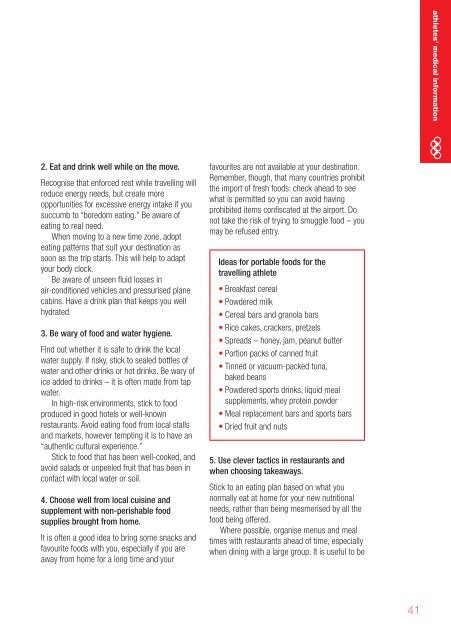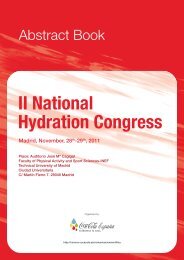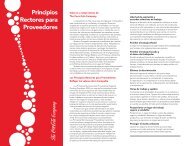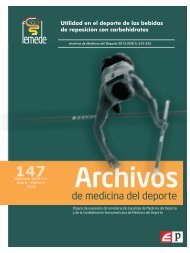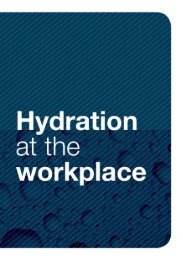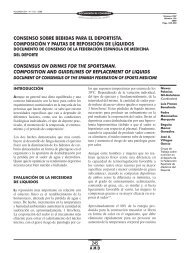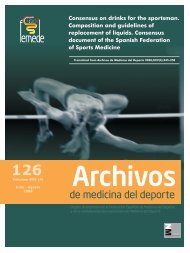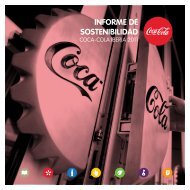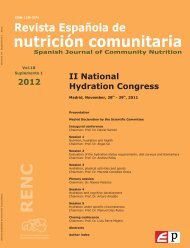Nutrition for Athletes - Coca-Cola
Nutrition for Athletes - Coca-Cola
Nutrition for Athletes - Coca-Cola
Create successful ePaper yourself
Turn your PDF publications into a flip-book with our unique Google optimized e-Paper software.
athletes’ medical in<strong>for</strong>mation<br />
2. Eat and drink well while on the move.<br />
Recognise that en<strong>for</strong>ced rest while travelling will<br />
reduce energy needs, but create more<br />
opportunities <strong>for</strong> excessive energy intake if you<br />
succumb to “boredom eating.” Be aware of<br />
eating to real need.<br />
When moving to a new time zone, adopt<br />
eating patterns that suit your destination as<br />
soon as the trip starts. This will help to adapt<br />
your body clock.<br />
Be aware of unseen fluid losses in<br />
air-conditioned vehicles and pressurised plane<br />
cabins. Have a drink plan that keeps you well<br />
hydrated.<br />
3. Be wary of food and water hygiene.<br />
Find out whether it is safe to drink the local<br />
water supply. If risky, stick to sealed bottles of<br />
water and other drinks or hot drinks. Be wary of<br />
ice added to drinks – it is often made from tap<br />
water.<br />
In high-risk environments, stick to food<br />
produced in good hotels or well-known<br />
restaurants. Avoid eating food from local stalls<br />
and markets, however tempting it is to have an<br />
“authentic cultural experience.”<br />
Stick to food that has been well-cooked, and<br />
avoid salads or unpeeled fruit that has been in<br />
contact with local water or soil.<br />
4. Choose well from local cuisine and<br />
supplement with non-perishable food<br />
supplies brought from home.<br />
It is often a good idea to bring some snacks and<br />
favourite foods with you, especially if you are<br />
away from home <strong>for</strong> a long time and your<br />
favourites are not available at your destination.<br />
Remember, though, that many countries prohibit<br />
the import of fresh foods: check ahead to see<br />
what is permitted so you can avoid having<br />
prohibited items confiscated at the airport. Do<br />
not take the risk of trying to smuggle food – you<br />
may be refused entry.<br />
Ideas <strong>for</strong> portable foods <strong>for</strong> the<br />
travelling athlete<br />
• Breakfast cereal<br />
• Powdered milk<br />
• Cereal bars and granola bars<br />
• Rice cakes, crackers, pretzels<br />
• Spreads – honey, jam, peanut butter<br />
• Portion packs of canned fruit<br />
• Tinned or vacuum-packed tuna,<br />
baked beans<br />
• Powdered sports drinks, liquid meal<br />
supplements, whey protein powder<br />
• Meal replacement bars and sports bars<br />
• Dried fruit and nuts<br />
5. Use clever tactics in restaurants and<br />
when choosing takeaways.<br />
Stick to an eating plan based on what you<br />
normally eat at home <strong>for</strong> your new nutritional<br />
needs, rather than being mesmerised by all the<br />
food being offered.<br />
Where possible, organise menus and meal<br />
times with restaurants ahead of time, especially<br />
when dining with a large group. It is useful to be<br />
41


